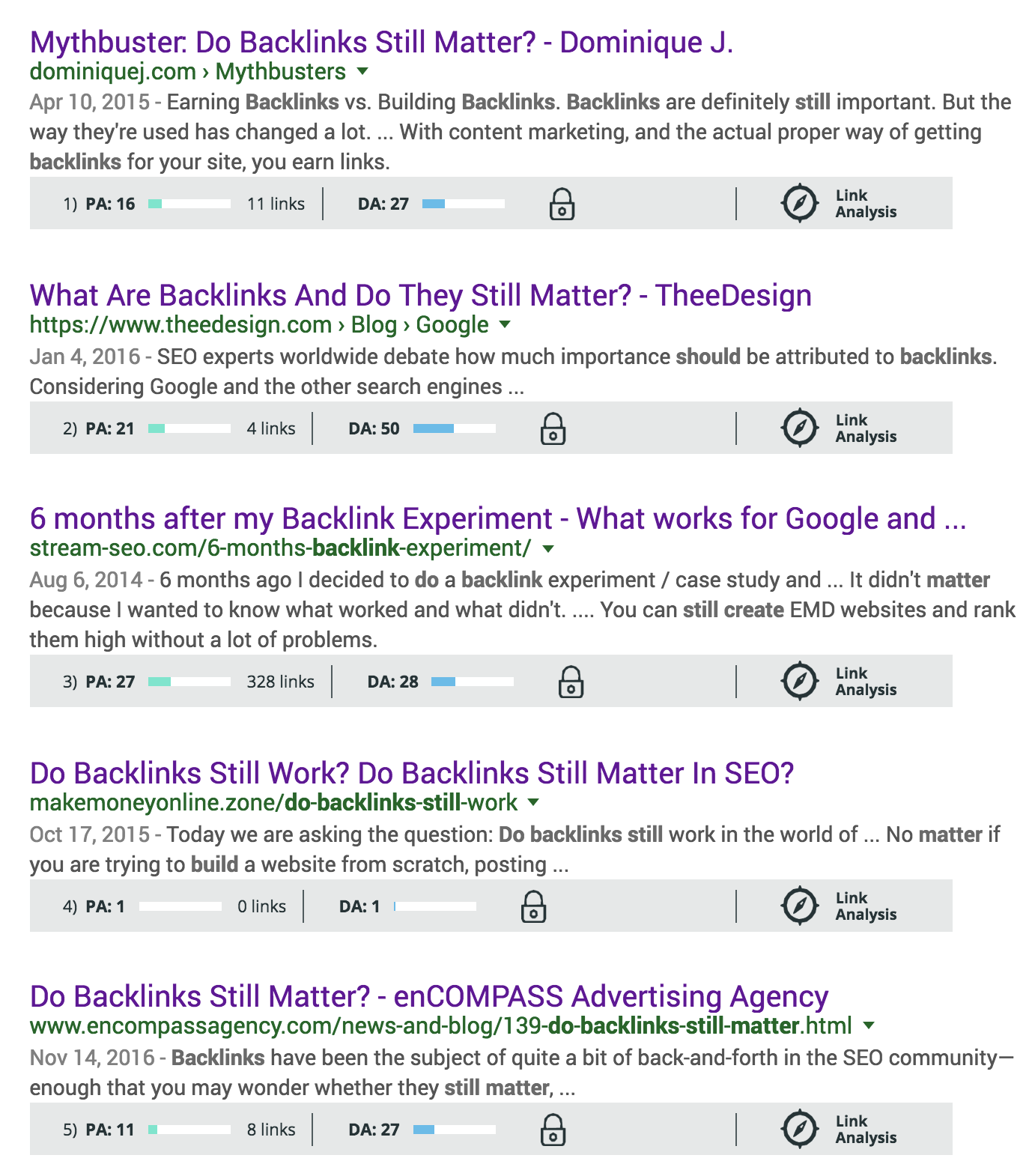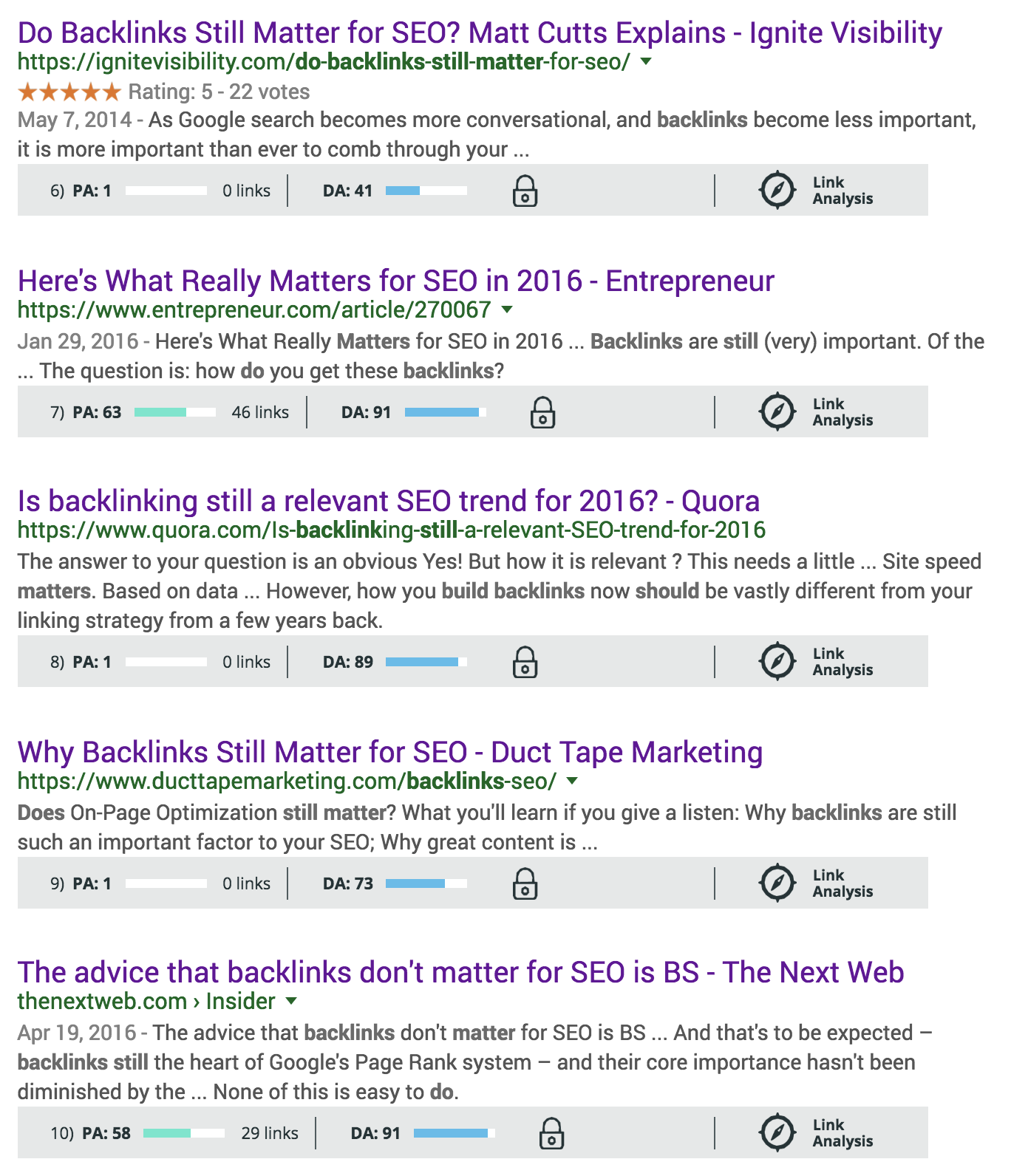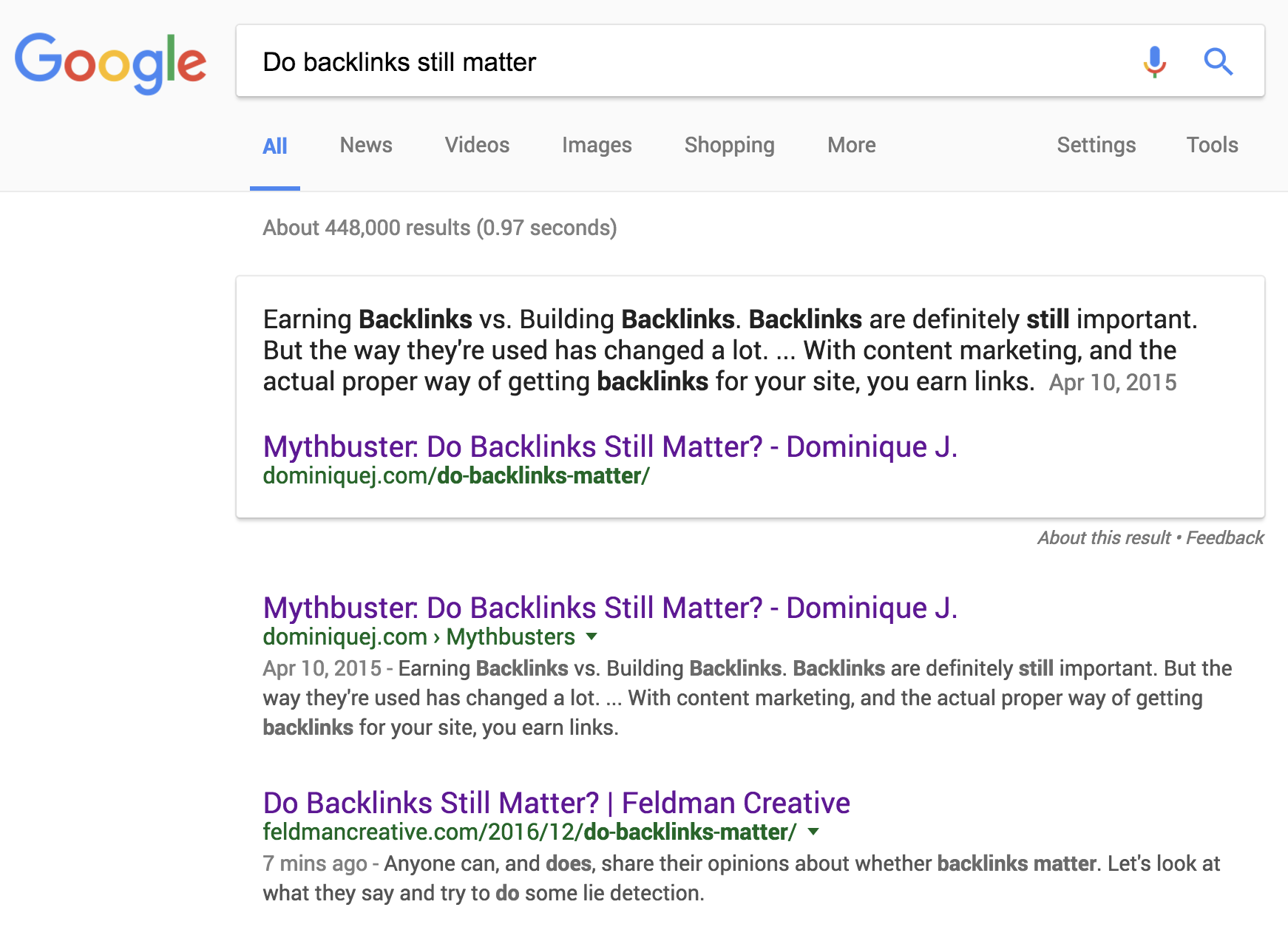True or false? Backlinks are the holy grail of search results.
The confusion remains. The speculation continues. And the research keeps pouring forth. The more you read this stuff, the less clear you are on the answers.
See, anyone can publish their take on SEO ranking factors. The search results themselves may be our best measure of credibility, unfortunately. Search engines are pretty amazing, but they’re definitely not lie detectors.
Even so, I asked Google for the answer. Or I should say, I asked Google to show me the top ten results for my question. I’m going to show you what I found, reflect on how much of what I read matters, and close with my opinions.
FYI: the data I present in the “numbers” for each search result come from:

- MozBar—for links and domain authority (DA)
- Buzzsumo—for social shares (which excludes Buffer and many popular networks and isn’t always up to date)
Here are the first five results on my SERP (search engine results page).

1st result
Dominiquej.com placed first with very humble numbers: 11 backlinks; domain authority of 27; only 10 social media shares. (Do domain authority or social shares matter? We’ll leave those questions for another post.)
Dominique’s conclusion:
“Don’t fall for the whole “backlinks don’t matter” myth. They do matter, and will continue to matter. Why? Because they are one of the best ways that Google has of determining the relevancy of a website for different search phrases.”
There’s the standard answer most accept as the truth.
2nd result
A post by Rob Delory of theedesign.com ranked second. The numbers: 4 backlinks; domain authority of 50; 15 social media shares.
“Whether your internet marketing person realizes it or not, backlinks are an essential part of any solid SEO strategy.”
So far, we have consensus amongst the top two results. Ironically, they come from blog posts with very few backlinks. Rob points out in his post the quality of the backlinks are an important factor.
3rd result
Stream-seo.com places third in this SERP. The numbers: 328 backlinks; domain authority of 28; 117 social media shares.
In the article, author Servando Silva reports his conclusions from a six-month backlinking experiment. He offers eight factors that matter, in his opinion, based on his experiment. “PR” links are included. (Don’t take his conclusions as the gospel. They’re one man’s point of view only.)
- Exact match domains
- Freshness (his post was published 2.5 years ago)
- The inclusion of a YouTube video
- Longtail keywords
- High PR links (PR = Pagerank, a secret Google number)
- Google Authorship
- Page speed
- Social backlinks
4th result
MakeMoneyOnline.zone places fourth. The numbers: 0 backlinks; domain authority of 1; 51 social media shares (46 from Google+).
“The simple answer is yes, backlinks still work today and they still contribute to the way that all websites are ranked within the search engines.”
The post’s author, Andrew Smith, gives a fundamental lesson on SEO and the most significant Google updates of the past few years. He warns you not to buy or build backlinks and practices what he preaches as evidenced by the fact his post has none—and it ranks high in this search result.
5th result
If “freshness” (recency of the publication date) matters, this post from enCompassAgency.com proves it because it was published less than a month ago. On the other hand, if quality is said to be an important ranking factor, this post disproves it because it’s very lightweight.
The numbers: 8 backlinks; domain authority of 27; 3 social media shares (46 from Google+).
“For all the chatter and all the controversy, backlinks—when they are gained legitimately, not through tricks or gimmicks—can still be a big deal for your website’s rankings. In fact, many experts believe that backlinks are among the most influential factors in determining a website’s rank.”
The post delivers 4 quick strategies for getting backlinks “the right way,” but is essentially a sales page.
Here are the next five results.

6th result
Talk about lightweight. This 2.5 year old post on IgniteVisibility.com is merely a video of Google’s former spokesperson, Matt Cutts, speaking to the question. I didn’t watch it. Cutts rarely provided insights you could actually use to improve your search results. His talks focused more on how to stay out of trouble.
The numbers: 0 backlinks; domain authority of 41; 2 social media shares.
The brief summary in the post reports that Cutts says, “backlinks have many year of viable use left,” but also, “they will become less important.”
7th result
This post from Entreprneur.com is contributed by Dmitry Dragilev and has the type of numbers you might expect to see on a page one SERP.
The numbers: 46 backlinks; domain authority of 91; 2.3K social media shares.
The post reports search ranking factors from Brian Dean of Backlinko.
“Of the 20-ish ranking factors Dean looked at, he found that backlinks are still the no. 1 most important ranking signal that Google uses.”
8th result
This post is a question and answer string from Quora.
The numbers: 0 backlinks; domain authority of 89; 27 social media shares.
The question posed: Is backlinking still a relevant SEO trend for 2016?
The skinny on the 11 answers the question has gathered thus far are:
- 8 say “yes”
- 2 say “no”
- 1 says “sometimes”
The most interesting answer in the thread is the “sometimes,” from Burak Berber, who wrote the following (edited by me for clarity):
“It’s important for some search terms, but it’s not important for some. You can’t describe it as relevant or not, but it’s not an easy question. Google explained about Pagerank and said links are not important, but there are millions of pages and search terms. I am working with some pages, which have strongly linked competitors and some which don’t. So it will be insignificant soon.”
Keep in mind anyone can post on Quora.
9th result
This result comes from DuctTapeMarketing.com and is a podcast featuring, who else, Brian Dean.
The numbers: 0 backlinks; domain authority of 73; 82 social media shares.
I didn’t listen to the podcast, but read Brian’s posts often. The synopsis on the page says if you listen you’ll learn:
- Why backlinks are still such an important factor to your SEO
- Why great content is still the key to achieving backlinks
- Why focusing on one great piece of content works even better than a blog post a day
10th result
Of the ten results, this one has the most provocative title: The Advice that Backlinks Don’t Matter for SEO is BS.
The numbers: 29 backlinks; domain authority of 91; 779 social media shares.
The author, Matthew Capala, authored a book about SEO. The post also calls upon Brian Dean’s findings.
“We found the number of domains linking to a page correlated with rankings more than any other factor,” wrote Brian Dean.
Do these observations matter?
If you’re in the SEO business, your story is backlinks still matter and you’re sticking to it, whether you can prove it or not. Some studies do well to prove it and others don’t.
This study, however informal it may be, presents the usual conflicting conclusions. I say that because:
- The answers (from the so-called experts) favor “yes, backlinks still matter.”
- The results prove otherwise. As you gathered, backlinks had little effect on the results of my search. In fact, there were 426 total backlinks on the top 10 results vs. 2,067 on results 11-20 on page two of my Google search. That said…
- Search results combine a ton of factors, which change. Searchmetrics, a company many believe to be an authority just published a post, which claims, “Traditional ranking factors have become irrelevant.” It continues, “Today’s rankings are driven by the dynamic between individual content relevance and user intent,” whatever that means. Their new study, they say, will clarify the finding.
- My search, “do backlinks still matter,” is a long tail search string that IS NOT searched 10 or more times per month, according to Google AdWords Keyword Planner. Still, I only created this post because I believe the question matters. I could have worded my search many different ways, such as “do backlinks matter anymore,” which has some search volume.
- Search terms such as “Google backlinks” and “Backlinking strategy” ARE searched hundreds of times each month. The results largely do have big or decent backlink numbers, however, pages with ZERO backlinks rank on both page one SERPs.
- Whether or not it matters, I predict sometime in the near future a search for “Do backlinks still matter?” will serve this article on the first page.* And it may appear for a variety of relevant searches (semantically related, they call it) because exact match titles are no longer important, especially on Google. I’ve found titles are interpreted more literally on Bing and DuckDuckGo.

*Wowza… Update: This post ranked second 7 minutes after it was published. I suspect it didn’t earn backlinks in those 7 minutes. Take this as nothing more than a testament to the power of longtail keyword phrases (for now). And of course, SERPs change daily or more.
What I think
Backlinks used to matter.
- They remain a search ranking factor today, but become less important every day. The search engine companies recognize backlinks can suggest quality and relevance, but know they often don’t.
- I wrote in SEO 2017: User Experience Optimization is What Matters Most, “Ranking signals have never been clear and never will be. I propose one thing is: user experience will soon trump all. I can’t tell you how it will be measured.”
Investing time in getting backlinks is for amateurs.
- When the opportunity is there, say you’re writing a guest post on a relevant topic, you should backlink to your blog or website, if allowed.
- Creating content, such as infographics, SlideShares, eBooks, and research reports, which are likely to naturally earn backlinks is smart. When other sites, especially reputable sites, link to your content, you earn more than backlinks; you earn credibility.
- I get emails everyday from blog authors pleading for me to include their content in posts I’ve published or future posts. I trash 99% of them. Your time is much better spent on building genuine relationships with bloggers or other types of content creators.
The more you serve the reader, the more Google serves you.
I thank Alexa’s Kim Cooper for the thought above and close with thoughts I shared on this topic on the Alexa blog, in 21-Point Checklist to Boost Your Blog Posts in Search.
Image courtesy of Alexa.com
A lot of SEO-minded bloggers will huff and puff about the backlink building strategies that catapulted their posts to the first page of search. I’m not one of them.
I have no backlink building strategy. Don’t get me wrong. I’m all for backlinks. They clearly can help a blogger earn the authority that helps you snag a ticket to high rankings.
Yet I don’t pay that stuff any mind. I don’t build, buy or barter for backlinks. I don’t write emails to the keepers of authoritative sites begging for links. Nor do I seek out guest blogging opportunities aiming to slip-in links to posts I’m trying to bolster.
I’m a certified backlink slacker. However, a lot of my blog posts rank on page one of search and a heap of them are inching their way there now.
So what do I do? How do I manage to get the coveted top ten spots on Google and Bing with so many of my pages? I simply earn them.
See, first of all, Google and the other search engines have got quite good at sniffing out the evidence that proves (or suggests) readers get value from your posts. As Alexa’s Kim Cooper wrote in SEO Copywriting for Google and Humans, “The more you serve the reader, the more Google serves you.”
And secondly, when you publish highly useful content and promote it well, it gets shared, seen, and yes, linked to.







![The Most Common & Costly SEO Mistakes [Content Jam Episode 35] The Most Common & Costly SEO Mistakes [Content Jam Episode 35]](https://feldmancreative.com/wp-content/uploads/2018/09/Content-Jam-podcast-35.png)
Comments
Arnie Kuenn
Hi Barry,
As always, I love your writing style and the way you present your information.
I just have a couple of comments on this:
1) I read through this once, and then scanned it again to be sure, but I don’t think you ever comment on the authority level of the inbound links. One solid link from a government site, or high authority news site, could trump dozens of links from lesser sites. So that is a metric that really matters with rankings.
2) The whole premise of your article supports what I have been trying to teach (tell) people for years now: look for gaps or opportunities in the search results, get the title (and meta title) right and create content that people are searching for. And forget about search volumes. You found a gap, wrote a nice piece and within minutes it ranked. It works!
Best,
Arnie
Barry Feldman
Arnie,
Thanks so much. Yes, you make a very good point regarding the authority level of links, so I hope readers get to your comment. “Forget about search volumes” is interesting to. I suppose zero search volume could be a problem, but we probably agree there really is no definitive source for determining search volume. Our friend Andy (who was quoting someone, I believe) said to create content for “things, not strings.”
Aina cell
This post is so informative for me thank you very much.
burak berber
Hey there,
if you have stronger competitors and if you are working for high search volumes with a new domain. Do you trust that you can work without backlinks ? If it’s possible, is there any way to start work with you right now ? I work with social links and high quality contents. But it’s too hard to increase in a high search term without links.
There are a lot of ”hero work” articles that say ”backlink is not important” bla bla. Most of copy paste ”experts” agree with you 🙂 but it’s working in action ?
Of course i don’t use backlinks all the time and it’s not important like all the time nowadays. But it still helps to increase in the searching. I want to make an experiment with this topic if you accept.
And if it’s not longer important to take backlinks why google did not clear the service named disavow tools ?
Your radical rules don’t work on in every action so reply is ”Sometimes(Mostly backlinks don’t work more but it’s important still to increase)” Be sure that i’ve tried this many times and please don’t forget to send me your works that proof of your article.
And thanks for other sections, it’s good article.
Respects
burak berber
Hey there, backlinks still matter for seo and it will not be. There’s no doubt for this. So if you are working with high search volume, You can’t easily increase just inbound and social links in short term. So ‘Sometimes’ is the correct answer still. If you are sure for that you can help to increase without any links i want to work together with you
Amirul Momenin
http://gokroy.com
Find nearest to you
1.You don’t need to have your own Shop
2.you can sell your product anywhere any time even when you sleep
3.make your business profitable worldwide
4.Your customer can search your product in your area
5.save time & money
Barry Feldman
Remove